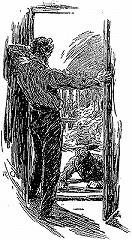Twenty had changed to fifteen, and fifteen to ten, but there was no news of the absentee. One by one the numbers dwindled down, and still there came no sign of him. Whenever a horseman clattered down the road, or a driver shouted at his team, the old farmer hurried to the gate, thinking that help had arrived at last. At last, when he saw five give way to four and that again to three, he lost heart, and abandoned all hope of escape. Singlehanded, and with his limited knowledge of the mountains which surrounded the settlement, he knew that he was powerless. The more frequented roads were strictly watched and guarded, and none could pass along them without an order from the Council. Turn which way he would, there appeared to be no avoiding the blow which hung over him. Yet the old man never wavered in his resolution to part with life itself before he consented to what he regarded as his daughter’s dishonour.
He was sitting alone one evening pondering deeply over his troubles, and searching vainly for some way out of them. That morning had shown the figure 2 upon the wall of his house, and the next day would be the last of the allotted time. What was to happen then? All manner of vague and terrible fancies filled his imagination. And his daughter - what was to become of her after he was gone? Was there no escape from the invisible network which was drawn all round them? He sank his head upon the table and sobbed at the thought of his own impotence.
What was that? In the silence he heard a gentle scratching sound - low, but very distinct in the quiet of the night. It came from the door of the house. Ferrier crept into the hall and listened intently. There was a pause for a few moments, and then the low, insidious sound was repeated. Someone was evidently tapping very gently upon one of the panels of the door. Was it some midnight assassin who had come to carry out the murderous orders of the secret tribunal? Or was it some agent who was marking up that the last day of grace had arrived? John Ferrier felt that instant death would be better than the suspense which shook his nerves and chilled his heart. Springing forward, he drew the bolt and threw the door open.

Outside all was calm and quiet. The night was fine, and the stars were twinkling brightly overhead. The little front garden lay before the farmer’s eyes bounded by the fence and gate, but neither there nor on the road was any human being to be seen. With a sigh of relief, Ferrier looked to right and to left, until, happening to glance straight down at his own feet, he saw to his astonishment a man lying flat upon his face upon the ground, with arms and legs all asprawl.
So unnerved was he at the sight that he leaned up against the wall with his hand to his throat to stifle his inclination to call out. His first thought was that the prostrate figure was that of some wounded or dying man, but as he watched it he saw it writhe along the ground and into the hall with the rapidity and noiselessness of a serpent. Once within the house the man sprang to his feet, closed the door, and revealed to the astonished farmer the fierce face and resolute expression of Jefferson Hope.
“Good God!” gasped John Ferrier. “How you scared me! Whatever made you come in like that?”
“Give me food,” the other said, hoarsely. “I have had no time for bite or sup for eight-and-forty hours.” He flung himself upon the cold meat and bread which were still lying upon the table from his host’s supper, and devoured it voraciously. “Does Lucy bear up well?” he asked, when he had satisfied his hunger.
“Yes. She does not know the danger,” her father answered.
“That is well. The house is watched on every side. That is why I crawled my way up to it. They may be darned sharp, but they’re not quite sharp enough to catch a Washoe hunter.”